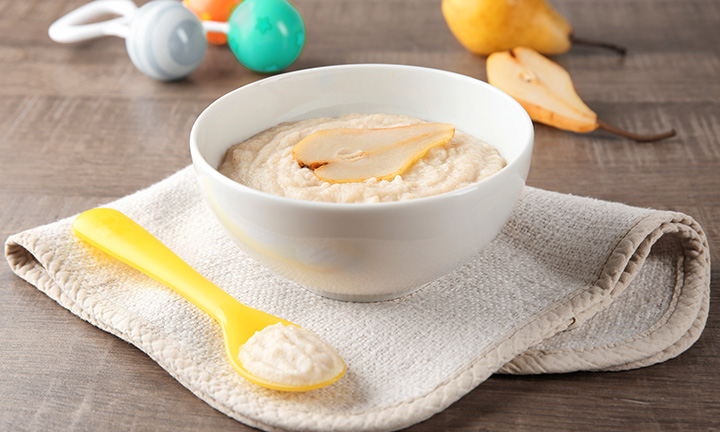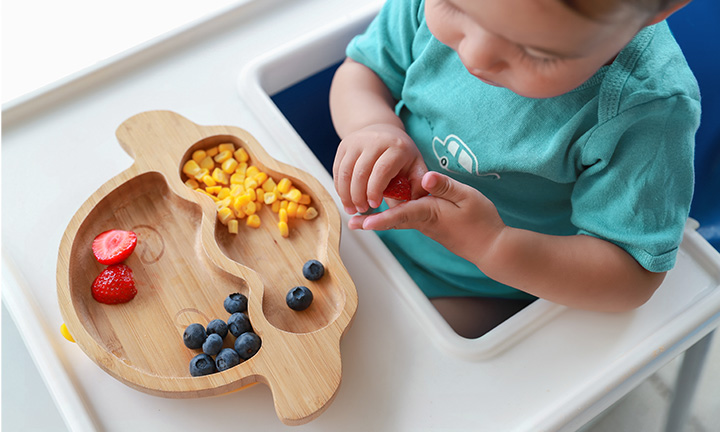
When Can Babies Eat Eggs?
If you’re starting your baby on solid foods, you might be thinking about what exactly they can eat and which foods are best for them. Fruit? Check! Vegetables? Check! Meats? Check! But when can babies have eggs? Eggs seem to inspire lots of questions, perhaps because we’re more aware of children’s allergies these days than ever before.
Read on to find out when it’s OK to offer eggs, why eggs have so many health benefits for babies specifically, and which methods of preparing and serving eggs are the safest for babies to eat.
When Can Babies Have Eggs?
One common question is how old babies need to be to eat eggs. You can introduce eggs to your baby around the same time you introduce solid foods, which is around 6 months old.
In the beginning, however, you’ll want to start with very soft or pureed foods (which can include whole grain infant cereals) before you progress to offering more textured foods.
Within two to three months after your little one starts eating solid foods, their expanded diet may include cereal, vegetables, fruits, eggs, and meats as well as breast milk or formula.
The Health Benefits of Eggs for Babies
Eating eggs (both the yolk and whites) has many health benefits, particularly for babies. One large egg (50 grams) contains
Choline is a key nutrient that’s involved in many biological reactions that take place in the body. For infants it’s very important for brain development and function. The same goes for DHA, which plays an important role in infant growth and brain development.
How to Introduce Eggs to Your Baby
Around the time you’re introducing eggs to your infant, it’s important to offer soft, easy-to-swallow foods that will break down into small pieces in their mouth to prevent choking. Since infants don’t yet have teeth, or have very few teeth, they aren’t able to chew—instead they mash foods with their mouths.
So, how do you cook eggs for your baby’s first time?
When it comes to preparing eggs for your baby, offer eggs that are scrambled, hard-boiled, or poached (as long as the eggs are firm and fully cooked). And how should you feed your baby eggs? You’ll want to mash the eggs with a fork to make them easier for your baby to eat.
If you’re a follower of baby-led weaning (BLW), you could offer these same preparations for eggs cut into small, finger food-style pieces and give them to your baby to self-feed.
Should You Delay the Introduction of Eggs to Your Baby?
In the past medical experts have advised against introducing eggs to infants and babies early on for fear of allergic reactions. But more recently experts have found there’s no reason to delay the introduction of eggs or other potential food allergens like fish and peanuts.
Introducing eggs to your baby (after 6 months of age) doesn’t increase the risk of an egg allergy or sensitivity. Therefore, delaying the introduction of eggs to your baby isn’t necessary.
Which Egg Dishes Should You Avoid Giving Your Baby?
Though scrambled eggs, hard-boiled eggs, and poached eggs with firm yolks are fine, other methods of preparing eggs in which the yolks are runny and undercooked aren’t recommended for babies—and even adults—due to the risk of salmonella. These include soft-boiled eggs, fried eggs with runny yolks, and poached eggs with runny yolks.
Here are some tips for buying, handling, and cooking eggs safely:
FAQS AT A GLANCE
Introduce scrambled eggs to your baby around the time you start them on solid foods, after 6 months of age. Eggs shouldn’t necessarily be their first food (you'll want to start with purees or very soft food) but introduce eggs along with other textured foods. Be sure to mash the scrambled eggs to make these easier and safer to eat for your baby.
The Bottom Line
Eggs are a great source of protein and other nutrients that are integral to your child’s development. So, despite what has been said in the past, there’s no reason to delay the introduction of eggs to your infant for fear of them developing an egg allergy or sensitivity.
So, when can babies eat eggs? Start offering eggs around the same time you start your baby on solid foods, after 6 months of age. Your little one’s menu can begin with purees and very soft food (like infant cereal) and then expand to include more textured foods, such as eggs, fruits, vegetables, and meats.
Stick to preparations of eggs in which the yolks are fully cooked, such as hard-boiled, scrambled, and poached (with firm yolks). Avoid preparations that have runny yolks (soft-boiled eggs, fried eggs, and runny poached eggs) as there’s a risk of your baby contracting salmonella.
Starting on solid foods is an egg-citing time! Offering all different kinds of foods and watching your baby’s reactions will be priceless.
- Book: Caring for your baby and young child, birth to age 5, Sixth Edition Paperback – November 2, 2014 by American Academy of Pediatrics (Author)
- Book: Guide to Your Baby’s First Years, Second Edition Paperback – 2020 by Mayo Clinic, Walter J. Cook, M.D. Kelsey M. Klaas, M.D. (Authors)
- NCBI: Egg Consumption in Infants is Associated with Longer Recumbent Length and Greater Intake of Several Nutrients Essential in Growth and Development
- FDA. What You Need to Know About Egg Safety
Read more about Baby
Join a World of Support
through Pregnancy and Parenthood.
TRACK WITH TOOLS
LEARN WITH EXPERTS
GET REWARDED










